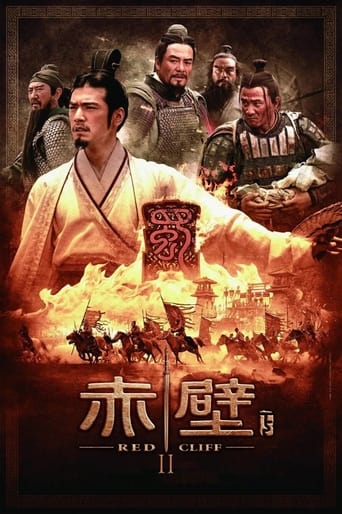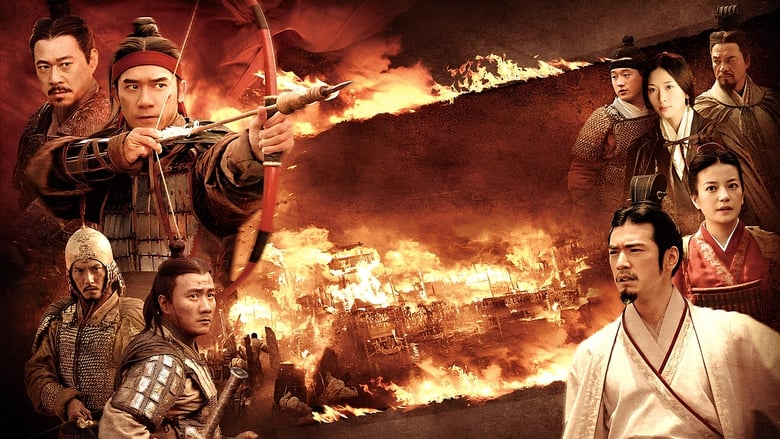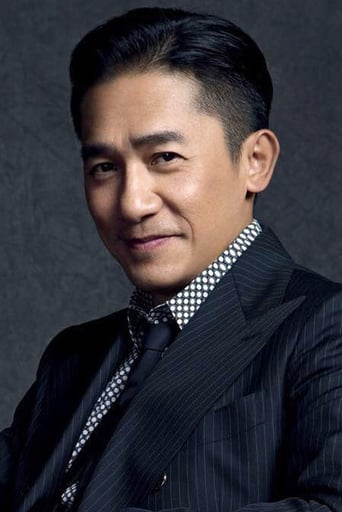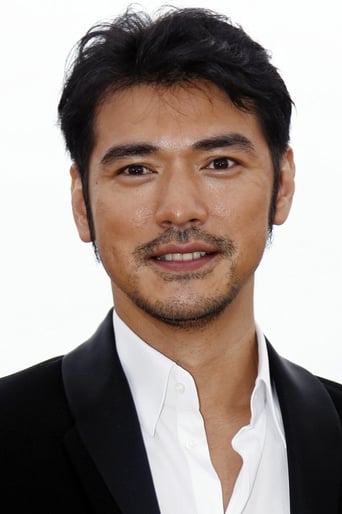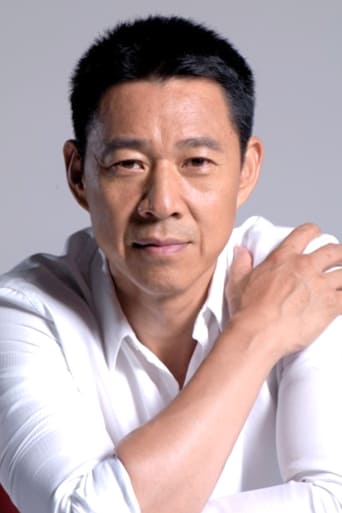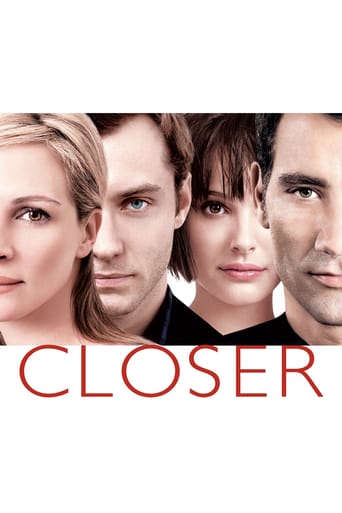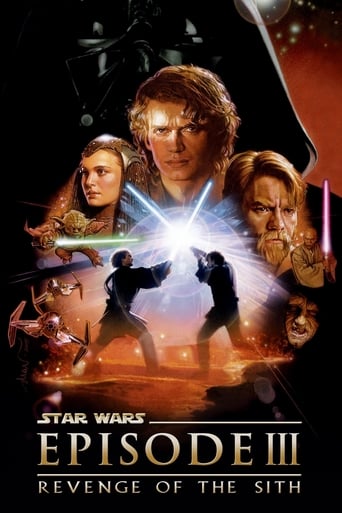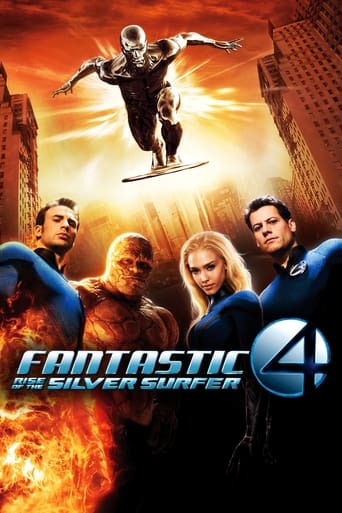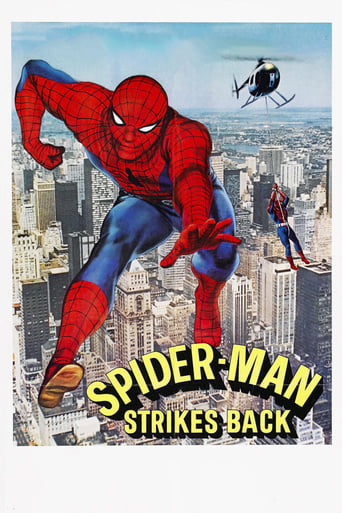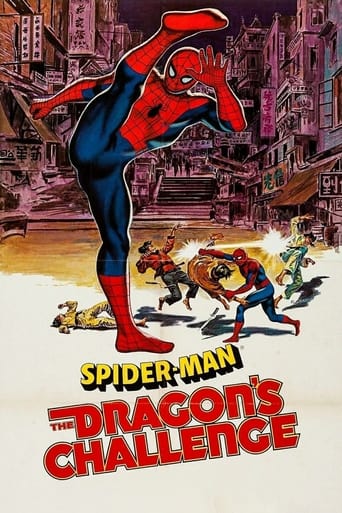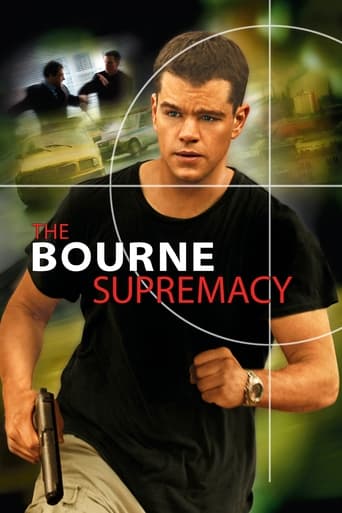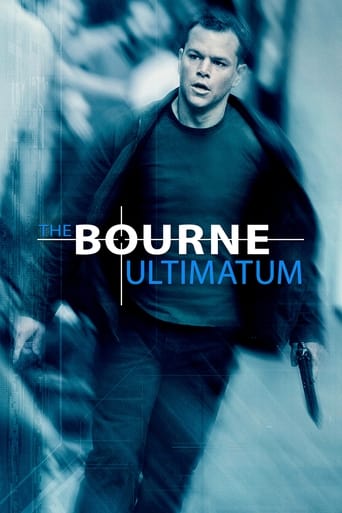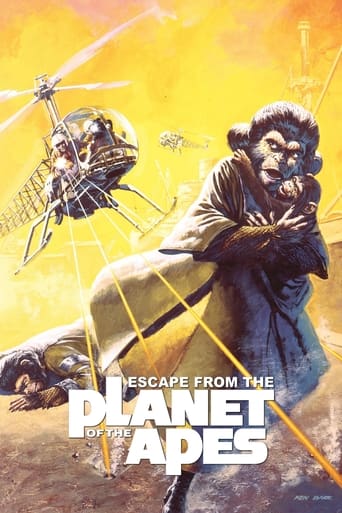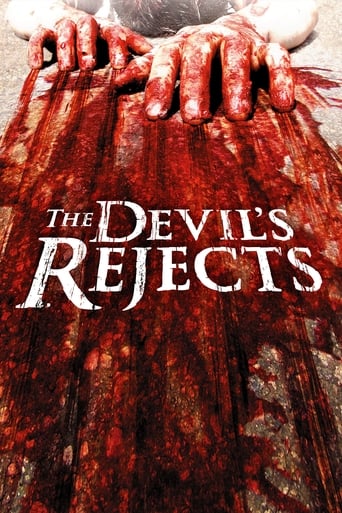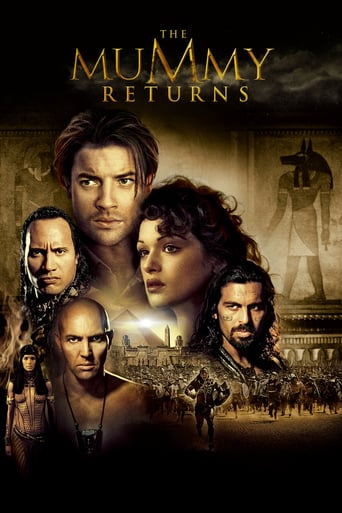Red Cliff II (2009)
The battle of Red Cliff continues and the alliance between Xu and East Wu is fracturing. With Cao Cao's massive forces on their doorstep, will the kingdoms of Xu and East Wu survive?
Watch Trailer
Cast


Similar titles
Reviews
The enjoyment of this film really relies on watching 'Part One' first as it introduces all the characters and explains the set up so my comments here assume the reader has seen part one.This follows on immediately from Part One with the rival forces on opposite banks of the Yangtze. Prime Minister Cao Cao has the superior forces and it looks as though things are getting even worse for the 'Rebels'. After a typhoid outbreak in his camp Cao Cao he puts infected bodies on rafts and lets then drift to the rebel camp where the infection spreads and causes Liu Bei to take his much needed troops away. It isn't all bad for the rebels, Sun Shangxiang has disguised herself as one of Cao Coa's soldiers and infiltrated his camp. Here she sends messages back while also drawing a map of all his fortifications and military formations; she also befriends an enemy soldier. The rebels have small victories when Zhou Yu uses subterfuge to make Cao Cao think his two top admirals are traitors and Zhuge Liang uses a particularly devious method to gain 100,000 arrows off their enemy. Sun returns to the rebels with her map and everything is set for the epic battle all they need is for the weather conditions to change to their advantage.If you enjoyed the first half of the story watching this film is a no-brainer especially if you bought the DVD which includes both parts! I'd advise not watching too much time between watching each part as very little time is wasted on getting the viewer up to speed on what happened before. The first half of the film effectively sets things up as the two side try to ensure their victory. Each has its ups and down as there are setbacks and minor victories. There is also some humour; much provided by Sun as she poses as an enemy soldier and nobody even suspects that this attractive woman is not a man! When the battle scenes start they are spectacular and barely let up till the end of the film. The action is impressively varied with explosions as fire sweeps through the fleet and more traditional fighting scenes. These scenes are tense and it is by no means certain who will survive. The cast does a great job bringing the characters to life with the help of John Woo's direction. Overall this was a gripping conclusion to the story.These comments are based on watching the film in Mandarin with English subtitle be warned the subtitles are rather small if you are watching on a relatively small TV unless you are close to the screen!
I'm always amazed to consider how much culture and worldview the Chinese have stored in them and how little of it has been tapped yet. Compare with American films, how many we get on our screens all across the world and what trivial philosophy supports them. The Chinese are still in a process of committing their vast narrative to first images. So with these two films, it seems at this point that getting down the chronicle in a simple way and make it boisterous entertainment was enough. We get history that flattens and oversimplifies, good lords against cruel despot, freedom against oppression, and swathes of conflict without nuance. We get a lot of chintz and scale. The first movie was without worth, but they tap into something else with this second one.Most of it is taken up by the machinations of the two rival sides for control over the narrative; ways to tip on their side the fateful battle before it begins the next day across the Yangtze. Some of it simple, rafts with infected bodies sailed into the opposite side. A spy manipulated to spread a false story. It's the main stratagem however that elevates it to something more, gathering up a different view than just opera.The stratagem is that the direction of the wind on the fateful night when navies meet is going to be crucial, wind having the power to decide the course of empire depending on which way it blows, north or south. The Way of Heaven (as Chinese viewers will know it) central in how fates dispense worldly order.This is what's being set up in an earlier sequence where one of the protagonists (who we have registered before as a kind of Confucian adviser to a lord) is able to stage and manipulate illusion (the barges with straw soldiers to gather up arrows) by having the knowledge of observing the structures of Nature - warm morning wind after a cold night means a fog that day.And yet it still could have gone either way that night, the balance as fickle as a candleflame in the wind. It's the loving wife who has changed sides hoping to avert the war who tips the balance that night; seducing the tyrant with a tea ceremony that is just buying her husband time, another staged illusion that comes from knowing how to observe the weather of Man, fickle desire tricked by beauty.The ensuing battle is a rip-roaring wind that blows north and rolls up an entire landscape of boats, men, and fortifications. This is the part with the spectacle most viewers will want to see.I'd rather keep with me all the other stuff and how it suggests a vantage point rooted beyond appearances. They come from the far center of Chinese soul. Spontaneous nature carrying the way (the Chinese character for "heaven" also invokes "nature", "sky" and "spontaneous"). Letting yourself bend to the way of the wind, timing the pull. Weather in and out. I can imagine it coming from the hands of a tea master like Wong Kar Wai, who can make the camera bend to the way of things, permitting us to take our own place within them; love, regret, memory. Woo just forces things in his way like a warlord. The scene where the spy woman (the most spirited being here) returns from the enemy camp and she lets the fabric with the map unfold from her body - that's Kar Wai.
I'm commenting on the UK release, titled simply Red Cliff.If you like a movie which is loaded up with battle and action sequences then this is the movie for you. This story of power struggles in first millennium China is told in Mandarin with English subtitles (and a disconcerting opening voice-over in US English).Directed by John Woo, there is much to enjoy visually - the battle sequences are, for the most part, thrilling, well choreographed, and well directed, and there are several standout moments - the shot featuring Woo's trademark white dove, for instance, and the fun of the arrow gathering raid.The visuals are not flawless, however - some of the aerial view battle scenes don't entirely convince, likewise some of the fire and explosion work, and there is a tracking shot of battle ships up the Yangtze which, while spectacular, is way over the top.The performances are all good, although I found it somewhat disconcerting that Cao Cao, the megalomaniac Prime Minister, bears a marked resemblance to the late Norman Beaton, a British character and comedy actor of Caribbean origin.The most important flaw, though, arises from the fact that this movie starts off in mid-story, and we never really get to grips with exactly what is at stake, who these people are, and why anything matters. A myriad of characters are introduced with captions explaining who they are: some of them are important but others are merely incidental characters. There is a sequence where the wife of one of the generals is killed but their baby is saved: this is a sequence which has a great deal of potential for an emotional payoff, but it never gets revisited. As a result the film is half over before there is any kind of emotional investment in the events taking place and, for that reason, I could never regard it as wholly successful.
I pretty much agreed w/ the reviews of 'A Nutshell Review' and '(lovehkfilm.com)'. I'm a bit less enthusiastic than the latter because of the ending (more on that later), but I do agree w/ him that this is the best John Woo film in the last 10, no, 15, yrs since 'Hard Boiled'.This is so much better than the 1st part in terms of pacing, story, and dialog that it's not even funny. As a fan of both Woo's HK movies and the novel, I thought there're certain aspects in the story that were handled much better in the movie. For example in the novel, the use of the 33rd stratagem 'Let the enemy's own spy sow discord in the enemy camp' to dispose of Cao Cao's naval generals always comes across as a bit too simplistic; the use of the 34th stratagem 'Inflict injury on one's self to win the enemy's trust' stretches my limit of suspension of disbelief (the reason was explained in the movie), and Zhuge Liang is someone with super-natural powers w/ the ability to change wind directions (as oppose to in the movie where he's just an expert in meteorology). Sun Shangxiang as a spy in enemy camp did stretched my limit (not because she's female but because of her princess status), but since Zhao Wei's also playing Mulan in a upcoming movie I'll grudgingly accept that for the sake of entertainment. What I couldn't accept was the rushed ending which was handled much better in the novel. Cao Cao should have had more than 2 capable generals at the end to at least stall, if not match the opposition's generals one on one and I would have accepted that, in the melee of trying to save Xiao Qiao, Cao Cao was rushed away by some of his other generals, and that they would not pursue him because after all, it's 50K+ against 800K+ and the victor's would have suffered heavy casualties as well. It was a 9-rating movie up to that point, but since it's Woo's best movie in a while I'll just dock another point.In conclusion, don't miss this if you're a John Woo fan (of his HK movies).

